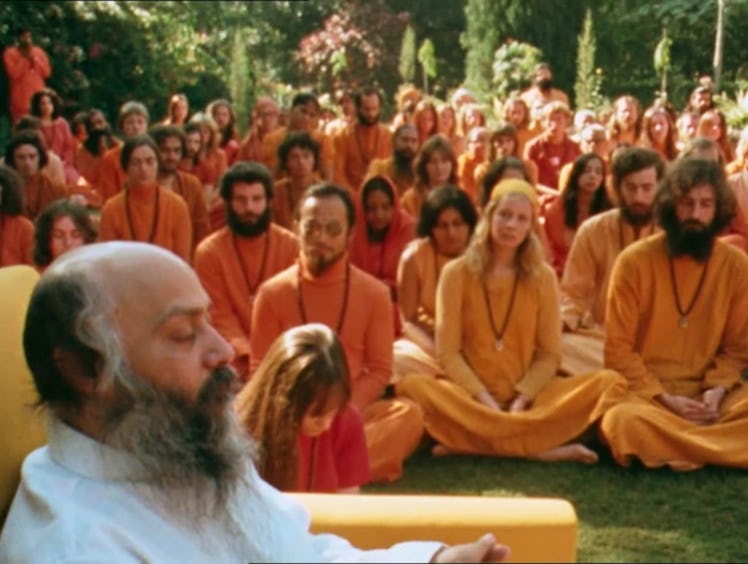
If You Love Intense Docu-Series, You Need To Watch Netflix's 'Wild Wild Country'
Netflix just made your life even better with a new documentary on the platform. On Friday, March 16, the streaming platform released Wild Wild Country, a docu-series about the Rajneeshpuram commune's repeated attempts to run a small Oregon town in the 1980s. The six-episode series combines archival footage of the cult members, present-day interviews, and videos of the guru Bhagwan Shree Rajneesh preaching to his thousands of followers. There are plenty of questions at the heart of Netflix's Wild Wild Country documentary series, but one thing is clear: This show is about to become your new obsession.
The six episodes of Wild Wild Country primarily follow guru Rajneesh from 1981 to 1985, the period of time when he and his commune members were living near Antelope, Oregon on a massive ranch. According to Biography, Rajneesh first attracted followers in 1970 in India due to his anti-establishment teachings: he advocated for open sex, frequent meditation, and freedom of individual expression. In 1981, Rajneesh fled to the United States into central Oregon. Rajneesh, however, did not consider the group a cult, and his right-hand, Ma Anand Sheela, told a lawyer in 1984 during a deposition, "I am the head of the religion. And I request you to respect that and address me in same fashion,” as reported by Oregon Live.
As the commune grew to as many as 2,000 devoted members, Rajneesh looked to expand into Antelope, angering the town's residents. According to The Oregonian, the Rajneeshees allegedly began poisoning the town by "contaminating salad bars at local restaurants." According to The Atlantic, Rajneeshees denied involvement in the contamination. Rajneesh's right-hand, Ma Anand Sheela, later pleaded guilty to poisoning salad bars across the town, as reported by the LA Times.
In 1985, the state pressed charges and Rajneesh pleaded guilty to "arranging sham marriages to allow his foreign-born followers live in the United States," according to the New York Times. In exchange for his plea, Rajneesh was required to leave the United States, and he then moved to India, where he founded the Osho International Meditation Resort before dying in 1990.
In addition to explaining the controversy surrounding what The Oregonian claims is "the largest biological terrorism attack in U.S. history," Wild Wild Country also follows Rajneesh's right-hand, Ma Anand Sheela. The docu-series depicts Sheela as the guru's closest aid and a fearless devotee of the religion who was willing to resort to violence to protect the commune.
In 1986, Sheela pleaded guilty to poisoning salad bars across the town, wiretapping her own members, and conspiracy, as reported by the LA Times. She served a two-year sentence and then left the county, as she was required to do by her plea agreement. She's lived in Switzerland since 1990, where she now runs a nursing home. According to Oregon Live, Sheela is trying to move on from the Rajneeesh part of her life. "I am labeled a criminal. It is stamped on my forehead," she said. "I have been punished. Leave me alone."
Like many other documentaries about cults, Wild Wild Country feeds into our desire to understand what makes someone join, or lead, a cult. As fans saw in American Horror Story: Cult, there are many things that drive people to join a fringe group, and often, someone's reasons for joining come into conflict with the egocentric goals of the group's leadership. Wild Wild Country suggests that many members of the Rajneeshee commune were drawn to the youthful, progressive nature of the guru's message, especially when the only other group of people in town were older, conservative citizens interested in maintaining the status quo. Netflix's docu-series presents these Oregonians as equally hostile of the Rajneeshees, and while the cult brought things to a level that required legal consequences, the series does attempt to show that the situation escalated so quickly because of actions on both sides.
Unlike AHS: Cult or Paramount Network's Waco, Wild Wild Country doesn't speculate about why these people joined a cult: it features present-day interviews with members, most of whom are now just regular people. The exploration of the cult's leadership is fascinating, no doubt, but it's these interviews that will leave you thinking for days to come. Because at the end of the day, we all want to believe that we'd never fooled by a cult leader, but is there any way to know for sure?